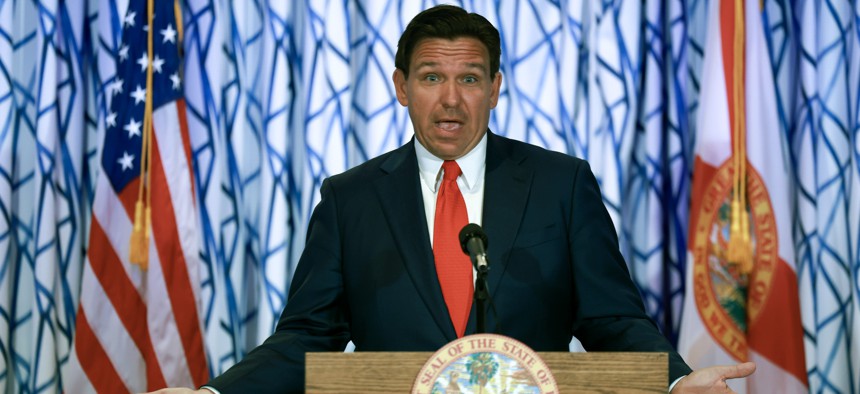New Florida law bans kids under 14 from social media

Joe Raedle/Getty Images
It is the latest in a series of efforts by states to regulate social media in a way that protects minors and stands up to legal challenges. But opponents say Florida’s law still runs afoul of the First Amendment.
Florida Gov. Ron DeSantis earlier this week signed legislation banning children under 14 in the state from having social media accounts and requiring minors aged 14 and 15 to have parental consent to hold one.
The bill goes into effect in January and would force social media companies to delete existing accounts held by those aged 14 and under. Minors would also be prohibited from accessing websites with adult content. Social media companies and adult websites would be required to enforce these rules through age verification technology and delete user data immediately after verification.
Florida House Speaker Paul Renner said the law uses a “narrow four-prong test” to target platforms that employ addictive features aimed at persuading young adults to spend more time on social media apps. If platforms fail that test, they will be subject to the law.
The test considers if 10% of a platform's daily active users are children under 16 who use it for two hours or more each day; if they employ “addictive” design features; if they use an algorithm to gather personal information about users and use that data to provide content to keep them on the platform; and if they allow users to upload content and view the activity of others.
In a written statement, DeSantis said the legislation “gives parents a greater ability to protect their children.” Citing links between social media and higher rates of depression, self-harm and suicide among young people—a problem previously identified by U.S. Surgeon General Vivek Murthy and others—Renner said in a statement that the internet “has become a dark alley for our children.”
The new law comes after DeSantis had previously vetoed similar legislation that would have banned all minors under 16 from having social media accounts. The governor expressed reservations with the measure because it excluded parents from the process and because he worried about adults losing the ability “to engage in anonymous speech.”
Florida’s law is the latest in a series of efforts by states to regulate social media in a way that protects minors from the harms of social media and stands up to legal challenges.
Utah, in particular, has been struggling to achieve this balance. Amid the threat of legal action, Utah Gov. Spencer Cox signed two pieces of legislation earlier this month to amend his state’s social media laws, which were passed last year. The sponsors of the bills said the overhaul should help them withstand further legal action.
Under the revised laws, platforms are still required to use age verification technology and to disable certain product features on accounts held by minors. The laws also require what the bills’ sponsors call “default robust privacy settings” for minors; ban companies from sharing or selling minors’ data without parental consent; and provide parents or legal guardians supervision tools for minors’ accounts. Parents have been given a private right of action under the laws to hold social media companies liable for harm caused by addictive algorithms as well.
Social media companies would be able to overcome the assumption their products cause harm to Utah children—and so avoid legal liability—if they obtain parental consent for a minor to use a platform; if they display content chronologically without the use of algorithms; and limit a minor’s time on their platforms.
Often at issue in many of these and other efforts to regulate social media is free speech. A number of cases on the U.S. Supreme Court’s docket this term involves social media and the First Amendment. Most recently, the high court clarified when public officials can block someone on their personal social media accounts.
Florida and Texas are still awaiting a decision by the court on whether their laws designed to prevent the alleged censorship of conservative viewpoints by social media platforms run afoul of the First Amendment.
Opponents of the Florida law may already be girding themselves for legal challenges. Days before DeSantis signed the legislation, NetChoice, an advocacy group that has brought lawsuits against various social media bills across the country, called it “unconstitutional” as it infringes on Floridians’ First Amendment right to share speech online. NetChoice also said the age verification requirements would establish an “ID for the internet,” and had urged DeSantis to veto it.
“We’re disappointed to see Gov. DeSantis sign onto this route,” Carl Szabo, NetChoice’s vice president and general counsel, said in a statement. “There are better ways to keep Floridians, their families and their data safe and secure online without violating their freedoms.”






